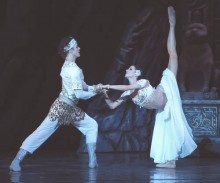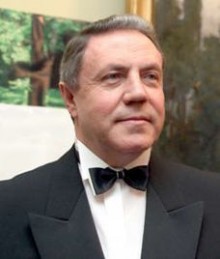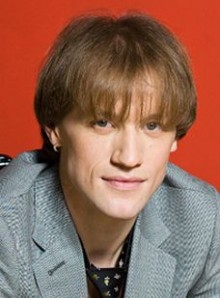The Day already reported that Aniko Rekhviashvili was appointed the new head of the ballet department of the National Opera of Ukraine. And the famous dancer, who, in fact, was the leader of the ballet troupe, Denys Matviienko (in late 2011 he was offered the post of the artistic director by Mykhailo Kulyniak, Minister of Culture at that time) gave a press conference under a loud title “Repressions in Culture. Why Denys Matviienko is not allowed to work at the National Opera of Ukraine and who is plotting it.” He reminded journalists that on March 27 on the official website of the National Opera of Ukraine his name disappeared from the “Management” page and was moved to the “Soloists” page.
“In such way the management of the theater marked its official position on me,” Denys Matviienko told The Day. “Since 2011 I was acting artistic director of the ballet troupe of the National Opera of Ukraine even though I worked at a rate of a soloist. I truly believed I could improve the state of ballet in Ukraine and bring our theater back on the world ballet map. It makes me sad that the reforms that have been launched will now wind up.”
On April 8, the directorate made a public statement on the website of the National Opera of Ukraine: “Due to the interest of the media in the situation around the famous dancer, artist of the National Opera of Ukraine, Honored Artist of Ukraine Denys Matviienko, we inform that he was taken on as a ballet dancer – the leading master of the stage of the National Opera of Ukraine in November of 2011 in accordance with the statement he submitted. From that time until now his status has not changed. There was a vacant position of artistic director of the ballet, which Matviienko did not occupy. Aniko Rekhviashvili, professor, ballet master, and choreographer was appointed to this position.”
Rekhviashvili choreographed Viennese Waltz by Johann Strauss (2001), Daniela by Mykhailo Chemberzhi (2006), ballet scenes in operas Moses by Myroslav Skoryk, Yaroslav the Wise by Heorhii Maiboroda, Norma by Vincenzo Bellini, Natalka Poltavka by Mykola Lysenko, a series of dance performances and solo dances. The artists of the theater think that it is nice that the director of the ballet is now a woman. Rekhviashvili is an even-tempered person and when the theater “is boiling like a kettle,” people working there need some peace.
The Day tried to find out what Matviienko managed to achieve in the theater. Let’s first look at the positive things accomplished by Matviienko: he included modern ballets like Radio&Juliet on music by Radiohead and Quattro, in the repertoire of the theater. He invited legendary Natalia Makarova (USA), who staged La Bayadere by Ludwig Minkus (the last premiere of the National Opera), to work with the troupe. Matviienko was able to negotiate with the Slovenian choreographer Edward Clug, who first trusted Ukrainian dancers to perform his ballet Radio&Juliet, and chief choreographer of the Mikhailovsky Theater Mikhail Messerer added Class-Concert to the repertoire of Kyiv National Opera. Ukrainian ballet fans also got a chance to see gala performance of “Four Kings of the Dance” and the ballet Quattro. Besides, Georgian prima Nino Ananiashvili appeared in Swan Lake and La Bayadere together with Matviienko. And this is great! However, these creative projects were conducted under the auspices of producer center “Sofit,” created by Matviienko’s sister and tickets were sold at market prices (ranging from 1,000 to 2,000 hryvnias) as for guest performances, and the revenue went not to the box office of the theater but into the pockets of private family company of Matviienko’s sister. They paid for the rent of the hall, while the dancers and assisting staff of the National Opera worked for standard wages (without bonuses and awards). By the way, the leading dancers of the troupe in the letter to Kulyniak (The Day has a copy of it) asked: “Why is there a need to stage modern ballet pieces at the National Opera? This would destroy Ukrainian ballet classics… Today, there is a desire to nullify the classic ballet, import foreign modern in Ukraine (under the temporary rights for using), and restore some foreign performances all smelling of naphthalene…”
Matviienko promoted his “projects” at the cost of sold-out performances from the repertoire of the theater. For example, in one of the letters to Minister Kulyniak about two dozens of artists and teachers wrote: “Rudeness, incompetence, lies in solving mercantile and financial issues became a norm in the theater. Brutal treatment of people, unethical attitude to teachers and tutors, manipulation of artists, composition of performers, and tours are organized in a form of ultimatums. All of this led to complete chaos and fomenting hatred and hostility in the once functioning and well-consolidated team… In the eight months of pseudo management of Matviienko he was absent from the theater for 121 days! Stop the bad experiment…”
“Matviienko is a wonderful artist and a ballet master of world renown. No one will take that away from him. When we invited him to join our company, we were hoping that he would inject ‘fresh blood’ and present interesting artistic ideas, because we knew him as a man of ambition. In order to maintain his professional record as a ballet dancer, we suggested officially employing him as a soloist and thus combine an artist’s career and administrative functions as the director of the ballet. Let me emphasize that the position of the artistic director of the ballet troupe had been removed from the staffing list,” Petro CHUPRYNA, Director General of the National Opera of Ukraine, has told The Day. “Matviienko presented a plan for reorganizing our work so as to turn our theater into ‘one of the major ballet stages in Europe.’ We did not interfere with his examination of all of our artists, let him reorganize rehearsals and agreed that the repertoire needed to be updated – in a word, we supported nearly all his innovations. But not all colleagues welcomed his radical measures. Petitions to the Ministry of Culture were sent by both zealous supporters of reform and many leading artists of the company who believed that breaking was easier done than building, as the saying goes, and that the best had to be preserved and complemented with emergent new things… You know I don’t remember having so many diametrically opposed opinions, conflicts and scandals in the company! We tried to somehow keep the emotions of the artists in check and let Matviienko realize himself, but he failed to organize the work in such a way as to make the company function normally. Narcissism, intolerance of dissention and authoritarianism played a nasty trick on him. A company is about ‘we,’ not ‘I’! Because Matviienko was not officially the artistic director of the ballet troupe of the National Opera and the storm of discord reached a limit threatening a division in the staff, I intervened and appointed Aniko Rekhviashvili as artistic director. She is a choreographer, rather than a dancer, and shuns conflict, which will enable her to calm down the emotions in the theater. I am in favor of having storms on the stage and letting the artistry of dancers stir up the hearts of the audience, while maintaining a normal working environment behind the scenes. Matviienko is not being fired by anyone. He has simply failed to perform his administrative functions. Meanwhile, he can continue his cooperation with our theater as a soloist.”
In his commentary for The Day, Matviienko has emphasized that he did not expect “a stab in the back from the administration of the National Opera, which essentially put an end to reforms he had launched”:
“I was on a tour in London when I was informed that I was no longer the director of the ballet troupe but merely a soloist. Now they have renamed the position to which Aniko has been appointed. It is now called ‘director of the artistic workshop of ballet of the National Opera’ which obscures the meaning and suggests that there may be painting artists in ballet that need to be managed. This is absurd! I had a specific plan to reform the National Opera, but the situation can be changed only if its current administration is gone. They don’t need any experiments. They are content with the gray and mediocre… which is why I don’t see myself in this company (in any function). This is my principled stance. But this doesn’t mean I will not perform in Kyiv. I have many followers here, and I will be presenting various artistic projects, but they are not related to my work in the theater. Any reform is a painful experience to any company, and they need support to be continued. I was promised support by the director general of the National Opera, which is why I accepted his invitation to work there, but alas… My attempts turned out to be fruitless and were stifled without the support of the theater’s administration. It’s too bad! In this year and a half I have acquired huge experience. Most importantly, I acquainted the audience with modern stagings. My departure will be a loss to the current administration of the theater, while I am not saying farewell to the audience. Watch the bills! I have a lot of offers from various theaters, including the Mikhailovsky Theater… I don’t feel offended or, even less so, victimized!”
The Day’s FACT FILE
Denys Matviienko is Honored Artist of Ukraine, winner of four Grand Prix of international ballet competitions, for three years worked as a guest soloist with the Bolshoi Theater, for a year worked at the Mariinsky Theater, performed at the New National Theater in Tokyo, Teatro alla Scala in Milan, Grand Opera in Paris, and American Ballet Theater in New York. Since November 2011 worked as a soloist and leader of the ballet troupe at the National Opera of Ukraine.









